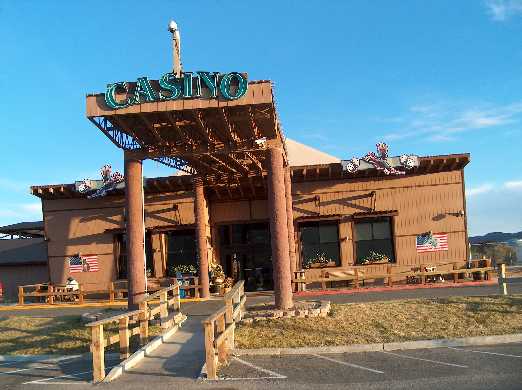 Another Stereotype of the Month entry:
Another Stereotype of the Month entry:
 Another Stereotype of the Month entry:
Another Stereotype of the Month entry:
From the San Franciso Chronicle:
EDITORIAL: Governor, don't expand gambling
Tuesday, May 11, 2004
GOV. ARNOLD Schwarzenegger wants to worsen a bad bet. Facing a $14 billion budget deficit, the governor is nearing a $1 billion deal with the Indian gambling industry that will give away what few controls the state has over a booming business.
The outlined agreement would represent a continuing distortion of tribal gambling's origin as an opportunity to allow modest-scale casinos at rural reservations where few economic opportunities exist.
California is at a crossroads. Its response to the pressure to allow greater proliferation of gambling — either by lifting the barriers on the scale of tribal operations or letting racetracks and card rooms into the game — will determine whether this state will surpass Nevada as the nation's gaming mecca.
It's time to say no.
Since 1998, when voters legalized gambling on tribal land with the passage of Proposition 1A, the business has boomed to a $4 billion to $6 billion-a-year industry. Yet the state's general fund does not receive a penny of this money.
The proposition that authorized gaming has been distorted in many ways. Tribes that lost reservation land decades ago are now shopping for urban real estate to redefine as "historic land" for the sole purpose of opening casinos. The first such urban gambling spot could open next year in San Pablo — thanks to a Dec. 2000 amendment by Rep. George Miller, which literally rewrote history to state that the site was "federally recognized tribal land" in 1988.
Potentially powerful opponents of gaming expansion have been co-opted. Major Nevada gaming firms that once fought California gambling are running operations here. Many Sacramento politicians are knee deep in casino cash. Schwarzenegger might want to remember that one of the reasons he sits in the governor's office today is the voter revulsion with the way his main rival, Lt. Gov. Cruz Bustamante, was raking in gaming donations.
Schwarzenegger is now looking at a proposal to waive the limit of 2,000 slots per casino in exchange for up to a $1 billion one-time payment and future royalties of up to $500 million per year on new slots.
Sure, Schwarzenegger is facing budget pressure, but he should consider the history of gaming in America: There is always going to be pressure to get bigger and gaudier, just as surely as hotels are routinely imploded on the Las Vegas Strip to make way for the latest temples of excess. Another axiom of life: Once government becomes dependent on a revenue source, politicians are going to be tempted to look for ways to expand it.
Schwarzenegger should reject the proposals to expand gaming. Once he does, Californians should consider the implications of two gambling measures on the November ballot.
One is backed by card rooms and racetracks that want to bring 30,000 slot machines into their facilities. The second is backed by a tribe with two Palm Springs casinos that wants to drop limits on the number of slots in exchange for a yearly tax of nearly 9 percent on revenues.
If any of these proposals comes to fruition, California will quickly surpass Nevada as the nation's top gambling state.
Past public votes make it clear that the casinos are here to stay. There have been some modest benefits: gambling employs thousands of dealers, bartenders and other workers.
A few reservations that were Third World backwaters where jobless families lived in shacks are now gated communities with schools and clinics. But those benefits do not fall evenly. Of the 54 casinos in operation, 15 control nearly half of the state's 62,000 slot machines, the primary money-maker. There is a $150 million fund supplied by big-casino tribes that pays tribes with small or no gambling operations.
The state's wealthiest tribes, though hardly united, are chafing at the existing rules. The sticking point is the ceiling on slot machines, which generate up to 80 percent of the take.
If this slot limit is dropped, there will be nothing to hold back a new wave of casino expansions. Schwarzenegger should consider the consequences:
— Accepting the money will unleash gambling in the nation's most populous state. Free of limits, some of the casinos will soon be on a scale with the biggest on the Las Vegas Strip.
— The tribes will gain the major benefits even though the state will reap short-term relief. Left out are nearby communities who have no control over building scale, traffic congestion or pollution linked to casino size.
— More special-interest politics will flourish if the governor caves in to the casinos. Any future attempt to improve on this lopsided deal will be met with heavy-spending opposition from tribes.
— "Reservation shopping" will proliferate without limits on casino size. Shopping involves small, landless tribes hunting for prime casino land in urban areas. The Lytton Band of Pomo Indians has lined up a former card room in San Pablo for a future casino, and the Federated Indians of Graton Rancheria are negotiating for a site near Rohnert Park.
— There is little effective oversight of gambling. Tribal sovereignty greatly undercuts state power to inspect, audit and punish gambling violations. Tribes claim they have an interest in clean operations, but this argument is illogical as operators can't be expected to publicize cheating or fraud on their premises.
— The broader social cost of problem gambling should be weighed. In 1999, a federal commission, in calling for a pause in gambling's growth, concluded that 1.5 percent of adults had serious gambling problems and that the number will grow as the industry expanded. California shouldn't fulfill this prophecy.
Schwarzenegger must resist the temptation to expand casino gambling for a quick financial fix.
It's time to draw the line.
©2004 San Francisco Chronicle

Rob's reply
>> Tribes that lost reservation land decades ago are now shopping for urban real estate to redefine as "historic land" for the sole purpose of opening casinos. <<
First, most tribes are not doing this. Second, "urban real estate" happens to be where the tribes used to be. Third, Indians "lost" their land because Anglo-Americans stole it.
>> Many Sacramento politicians are knee deep in casino cash. <<
Another example of the too-powerful Indians stereotype.
>> Schwarzenegger is now looking at a proposal to waive the limit of 2,000 slots per casino in exchange for up to a $1 billion one-time payment and future royalties of up to $500 million per year on new slots. <<
This proposal does nothing to further "reservation shopping." Tribes would still be limited to their historic reservations except in unusual cases.
>> Schwarzenegger should reject the proposals to expand gaming. <<
What about how the tribes don't pay a penny to the state? Doesn't the SF Chronicle want to change that? Talk about illogical...the Chronicle rejects a proposed solution to the problem it identified.
Many tribes would be quite satisfied to keep their present compacts. Only a few want to expand beyond the present limits.
>> Once he does, Californians should consider the implications of two gambling measures on the November ballot. <<
If Schwarzenegger and the tribes come to an agreement, the ex-Terminator probably will oppose the gambling initiatives and they'll fail.
>> A few reservations that were Third World backwaters where jobless families lived in shacks are now gated communities with schools and clinics. But those benefits do not fall evenly. <<
Again, the SF Chronicle is arguing for the status quo. How does that address this alleged problem?
Actually, Congress never intended the benefits of Indian gaming to "fall evenly." Nor is it reasonable to expect the benefits would. The 50 states don't take in the same amount of revenue or give their citizens the same benefits. Why should tribes follow a "socialist" pattern that states don't?
>> Accepting the money will unleash gambling in the nation's most populous state. Free of limits, some of the casinos will soon be on a scale with the biggest on the Las Vegas Strip. <<
If so, those casinos will be where they are now—on the reservations.
>> The tribes will gain the major benefits even though the state will reap short-term relief. Left out are nearby communities who have no control over building scale, traffic congestion or pollution linked to casino size. <<
By all reports, Schwarzenegger is negotiating on those issues. Does the Chronicle really think Arnold is a naive dupe whom the tribes will take to the cleaners?
>> More special-interest politics will flourish if the governor caves in to the casinos. Any future attempt to improve on this lopsided deal will be met with heavy-spending opposition from tribes. <<
What lopsided deal? The Chronicle hasn't made the case that the deal will be lopsided.
Even the paper admits the tribes will pay more money—which will help the state's budget, the underfunded tribes, and the communities surrounding the casinos. And that's before Schwarzenegger negotiates further safeguards. So how exactly are the tribes getting a better deal than they have now?
>> "Reservation shopping" will proliferate without limits on casino size. <<
False. "Reservation shopping" has nothing to do with "casino size"—that is, the number of slot machines allowed. This is called a red herring, or perhaps a lie.
>> The Lytton Band of Pomo Indians has lined up a former card room in San Pablo for a future casino, and the Federated Indians of Graton Rancheria are negotiating for a site near Rohnert Park. <<
Yes...so? If it's happening now, that proves the negotiations aren't necessary to make it happen. But the governor has veto power over any proposed off-reservation casino, so this is scaremongering. Tribal gaming hasn't happened in urban areas yet and it won't happen without the approval of the governor (representing the public's interests).
>> There is little effective oversight of gambling. <<
Says who? See The Facts About Tribal Government Gaming Regulation for more information.
>> The broader social cost of problem gambling should be weighed. <<
Tribes have weighed it. Their present contributions help fund problem-gambling programs. And who says Schwarzenegger and the tribes won't negotiate more funding for problem gambling?
Related links
Too-powerful Indians
The facts about Indian gaming
|
. . . |

|
All material © copyright its original owners, except where noted.
Original text and pictures © copyright 2007 by Robert Schmidt.
Copyrighted material is posted under the Fair Use provision of the Copyright Act,
which allows copying for nonprofit educational uses including criticism and commentary.
Comments sent to the publisher become the property of Blue Corn Comics
and may be used in other postings without permission.